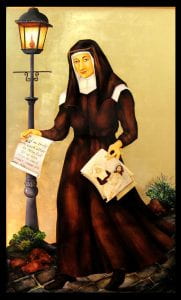 Look at this woman in motion. As her spry steps fade, did you sense a breeze from the alacrity of her brisk and cheerful readiness? Yes, “We’ve seen this beautiful portrait.”(1) We recognize Louise de Marillac, friend and collaborator of Saint Vincent de Paul. Why do we still reminisce about her 360 years, or to be exact 131,490 days, after her death on 15 March 1660?
Look at this woman in motion. As her spry steps fade, did you sense a breeze from the alacrity of her brisk and cheerful readiness? Yes, “We’ve seen this beautiful portrait.”(1) We recognize Louise de Marillac, friend and collaborator of Saint Vincent de Paul. Why do we still reminisce about her 360 years, or to be exact 131,490 days, after her death on 15 March 1660?
Working amid natural disasters, refugee crises, and public health catastrophes, Louise spoke candidly to those with whom she worked. “Who are we to think that we should be exempt from public evils?”(2) She instructed them not to “be impatient with…trials;” to acknowledge that they “will see a great amount of misery” among people which they cannot relieve.(3) Louise urged solidarity—“share their trials” and do whatever is possible “to provide them with a little assistance and remain at peace.”(4)
When circumstances separated Louise from her associates, she sought to be “creative to infinity,” not by sending tweets, but through friendly, hand-written messages.(5) For example, she wrote “I did not want to lose the opportunity to assure all of you that physical separation does not prevent spiritual presence among persons…united” by the bonds of a common mission.(6) Louise understood the difficulty of social distance, and the value of emotional connection for necessary mutual support. Those who knew Louise said that her life was “a mirror in which we have only to look at ourselves” for inspiration.(7) In probing her legacy, we discover the values that fueled her “thirst for justice.”(8)
Louise never knew her mother. She suffered heartache from family rejection. As wife and mother in an arranged marriage, she knew the pain of family conflict. As a widow she discovered God’s call to serve impoverished persons through home nursing, organized charity, educational opportunities, care for abandoned infants, and mentoring women to carry out the mission of the Daughters of Charity, which she, Vincent, and the first sisters developed together. We honor Saint Louise de Marillac, Patron of Social Workers, on her feast day of May 9.
In what ways could I help someone feel understood, connected, supported, and appreciated?
During our time of social distancing due to COVID-19, how could I promote mutual support—emotional care, solidarity, presence, and justice among us? How could I help others to feel less isolated?
- 119, The Virtues of Louise de Marillac, 24 July 1660, CCD, 10:582.
- L.353, To Sister Barbe Angiboust, (11 June 1652), Spiritual Writings, 396.
- Ibid.
- Ibid.
- 102, Vincent de Paul’s Exhortation to a Dying Brother, 1645, CCD, 11:131.
- L.628B, “To Sister Françoise Carcireux,” 15 September 1659, Spiritual Writings, 647.
- 118, The Virtues of Louise de Marillac, 3 July 1660, CCD, 10:577.
- A.30, (Meditation on the Hunger and Thirst for Justice), Spiritual Writings, 734.
Reflection by:
Betty Ann McNeil, D.C., Vincentian Scholar-in-Residence, Division of Mission and Ministry
Mission and Ministry Honors Louise de Marillac on the week of her Feast Day
The Division of Mission and Ministry honors Saint Louise de Marillac during this week leading up to her feast day (May 9th) with daily reflections on Louise’s living legacy: Sign up here for daily emails this week, which will invite you to reflect on the relevance of Louise’s wisdom for today.
For more on Louise de Marillac, see these resources:
